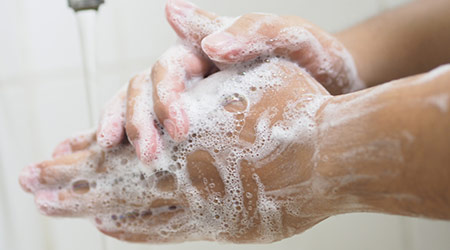Celebrating its 30th anniversary, National Infection Control Week (Oct. 14-12, 2018) is a time dedicated to sharing and exploring new research and opportunities to support infection control across healthcare facilities. In response to the growing need for streamlined, new-age hygiene practices and equipment, Tork conducted a survey of healthcare professionals to garner insights on their views of the role of technology and signage on hygiene compliance at their respective facilities.
The survey results highlighted a correlation between technology adoption and hygiene compliance in the eyes of healthcare workers. Specifically, healthcare professionals believe introducing new technology, such as hand hygiene monitoring systems, can play an important role in hygiene compliance and infection control across healthcare facilities. Ninety-five percent of healthcare staff consider it important for facilities to use the most up-to-date technology to mitigate infection, and 68 percent of workers acknowledged that introducing technology to their facilities has helped improve hygiene compliance.
Despite these sentiments, 40 percent of these respondents do not see their facility making a conscious effort to introduce new technology to address hygiene compliance and cleaning protocol. The most common barriers healthcare staff see to introducing new technology are a lack of financial resources (35 percent) and a lack of training & education (32 percent).
According to the World Health Organization (WHO), hand hygiene remains the single most important factor in mitigating the spread of health care-associated infections in healthcare facilities. Staff are increasingly looking to modern technology as a way to advance operational efficiencies and address hygiene compliance. With the majority of workers acknowledging the positive effects technology has when it comes to hygiene compliance, now is the time for healthcare professionals to treat technology with the utmost importance.
Connected devices like the Tork EasyCube® Facility Management System for data-driven cleaning utilizes Internet of Things (IoT) technology to provide real-time, actionable data from people counters and connected dispensers to keep facility managers and cleaners informed about cleaning status and provide insights into usage and traffic trends. On average, Tork EasyCube reduces cleaning rounds by 24 percent and cleaning hours by 20%, and yields a 30% increase in customer satisfaction. Simple, innovative technology solutions like Tork EasyCube help managers clean more efficiently, enabling facilities to exercise greater control over their environment.
Another way to encourage hygiene compliance is through signage. Respondents to the survey indicated that the vast majority (88 percent) of healthcare facilities have signage encouraging effective hand hygiene compliance and 95 percent of surveyed healthcare workers agree that this signage plays a critical role in compliance. Almost all facilities that have signs encouraging effective hygiene compliance post them in washrooms (93 percent) and more than two-thirds post them in patient rooms (68 percent).
Promoting proper hygiene can protect not only patients, but staff as well – keeping hygiene messaging fresh can be important to overall compliance. Resources like the Tork "Healthy Hands" website, provide healthcare facilities with free materials to help promote hygiene compliance. The site allows healthcare facilities to select a design, choose the message to be featured, and add their own logo to create free, customized hand hygiene signage.
Each year, National Infection Control Week is an opportunity to further educate staff and patients on what we can all do to prevent infection. It is also important that we take the time to celebrate infection control professionals and the efforts they have made across healthcare facilities globally. This week, we should all acknowledge the important work being done by these staff and remember that we all have a part to play when it comes to infection control.
Tom Bergin, marketing director for the North American Professional Hygiene business of Essity.

 Healthcare Facilities Look to Future-Proof Facilities
Healthcare Facilities Look to Future-Proof Facilities Yale New Haven Health Experiences Data Breach
Yale New Haven Health Experiences Data Breach Rethinking Facilities: A New-Generation Approach to Behavioral Healthcare
Rethinking Facilities: A New-Generation Approach to Behavioral Healthcare ThedaCare to Open Medical Center in Fond du Lac, Wisconsin
ThedaCare to Open Medical Center in Fond du Lac, Wisconsin UF Health Hospitals Rely on Green Globes to Realize Their Full Potential
UF Health Hospitals Rely on Green Globes to Realize Their Full Potential